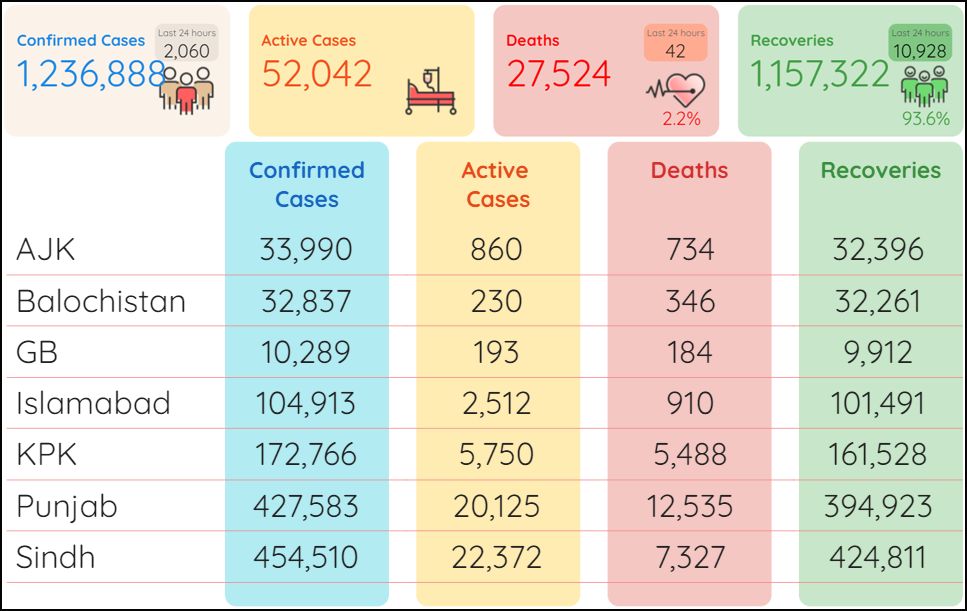
File photo
Confirmed infections of COVID-19 reach 1,236,888, against 1,157,322 recoveries and 27,524 deaths, leaving 52,042 active cases
Pakistan on Saturday reported 2,060 new infections of COVID-19 after conducting 44,958 tests—a positivity ratio of 4.6 percent.
The Civil Aviation Authority on Friday announced it was extending until Oct. 31 restrictions imposed on inbound flights to curb the spread of coronavirus. In a notification, it said all Pakistani nationals whose return flights from Category C countries—Costa Rica, Ethiopia, Guatemala, Iran, Iraq, Mongolia, Mexico, The Philippines, Slovenia, South Africa, Thailand, and Trinidad and Tobago—were scheduled before Oct. 31 could travel without grant of a special exemption. However, it said, they needed to secure a valid negative PCR test result conducted no earlier than 72 hours prior to the commencement of travel. Any non-Pakistanis wishing to travel to Pakistan from Category C countries remain banned, it added.
Confirmed Cases, Total – 1,236,888 (Tests: 19,147,075)
Punjab – 427,583
Sindh – 454,510
Balochistan – 32,837
Khyber-Pakhtunkhwa – 172,766
Islamabad – 104,913
Gilgit-Baltistan – 10,289
Pakistan-administered Kashmir – 33,990
Deaths – 27,524
Recoveries – 1,157,322
In the 24 hours preceding 8 a.m., Saturday, Pakistan’s confirmed cases climbed to 1,236,888. Meanwhile, deaths increased by 42 to 27,524. At the same time, recoveries increased by 10,928 to 1,157,322, or 93.6 percent of total infections. There are currently 52,042 active cases of COVID-19 in the country, with the NCOC saying 4,267 of them require critical care.

Punjab
On Saturday, authorities reported 21 deaths due to the coronavirus, raising total casualties to 12,535. The province now has 427,583 confirmed cases; it reported 944 new infections after administering 13,962 tests, a positivity ratio of 6.8 percent. There were 1,137 new recoveries recorded, leaving 394,923 fully recovered, and 20,125 active cases of the virus.
Sindh
Confirmed cases of the novel coronavirus in Sindh have now climbed to 454,510; it reported 652 new infections on Saturday after conducting 13,375 tests, a positivity ratio of 4.9 percent. The province reported 11 deaths, raising toll to 7,327, while its recoveries rose by 9,345 to 424,811. Overall, the province now has 22,372 active cases of the novel coronavirus.
Khyber-Pakhtunkhwa
The provincial government on Saturday reported 268 new cases after administering 11,418 tests, a positivity ratio of 2.3 percent. Overall, Khyber-Pakhtunkhwa’s confirmed cases have climbed to 172,766. It recorded 8 new deaths and 210 recoveries, raising toll to 5,488 and recoveries to 161,528. There are currently 5,750 active cases of COVID-19 in the province.
Balochistan
The province on Saturday raised its confirmed cases to 32,837 with 9 new infections after administering 856 tests; a positivity ratio of 1.05 percent. There was 1 death and 26 recoveries reported in the past 24 hours, leaving 346 fatalities and 32,261 fully recovered. There are now 230 active cases of COVID-19 in the province.
Federal Areas
Islamabad on Saturday raised its confirmed coronavirus cases by 149 to 104,913 after conducting 4,134 tests, a positivity ratio of 3.6 percent. There was 1 death and 131 recoveries recorded in the past 24 hours, leaving 910 casualties; 101,491 recovered; and 2,512 active cases.
Gilgit-Baltistan on Saturday reported 3 new cases after administering 449 tests, a positivity ratio of 0.67 percent; it currently has 10,289 confirmed cases. There were no deaths and 6 recoveries reported in the past 24 hours, leaving 184 fatalities; 9,912 fully recovered people; and 193 active cases of COVID-19.
In Pakistan-administered Kashmir, confirmed cases rose by 35 to 33,990 after conducting 764 tests, a positivity ratio of 4.6 percent. There were no deaths and 73 recoveries in the past 24 hours, leaving 734 fatalities and 32,396 fully recovered. It now has 860 active cases of COVID-19.
Across the world
Globally, the virus has now infected more than 231,902,789 people, with over 4,751,389 reported deaths. After having passed through multiple waves of the pandemic, the world is divided between countries that are either in the midst of new waves driven by mutated variants, or have launched mass vaccination drives that are allowing them to reopen safely. There are mounting calls, including from the World Health Organization, for “vaccine equality,” i.e. for developed nations to stop hoarding vaccines in excess of their requirements and to share them with the developing world to help curb the spread of new mutated variants, especially the Delta variant that is now driving the bulk of confirmed infections globally. Overall, around 208,510,026 patients of the 231.9 million+ infected have recovered thus far.
